
Content Index
- Introduction to Bluehost vs HostGator!
- Bluehost versus HostGator - Which One is Best?
- 1. HostGator VS Bluehost - Which one is Less Overwhelming to Set Up?
- 2. HostGator VS Bluehost - Which one has Affordable Pricing?
- 3. Bluehost vs. HostGator - Which one has Better Speed, Uptime & Overall Performance?
- 4. Bluehost vs. HostGator - Which one Has Better Customer Support?
- 5. Bluehost vs. HostGator - Which one is Best for WordPress?
- 6. Bluehost vs. HostGator - Which One Doesn’t Compromise on Security?
- 7. Blue host vs HostGator - Which One Has More Upbeat Features?
- 8. Bluehost vs. HostGator - Which One Has Better VPS?
- Hosting Providers That Are Also a Great Option Other Than Bluehost or HostGator!
- Final Thoughts on Bluehost vs HostGator!
- FAQs on HostGator vs Bluehost
Introduction to Bluehost vs HostGator!
So you have finally decided to create a website to support your business identity digitally? Well, congrats! What about web hosting, have you given a thought about it? Which one are you going to pickto store, secure, and run your website?
Oh, you are pondering over which one to choose between Bluehost vs HostGator (you picked them from the top 10 web hosting providers list, didn’t you?)
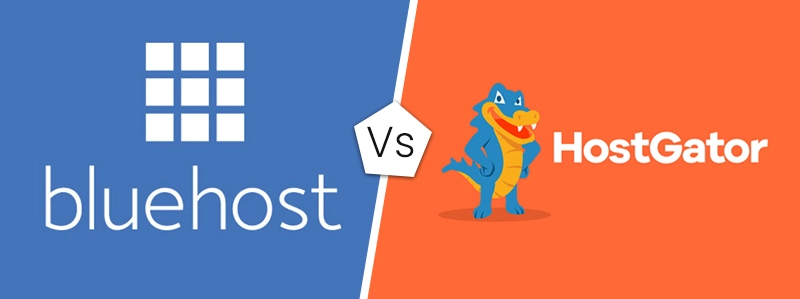
Well, for a fact, your pick is great as these are the most leading hosting providers in the market right now. So, to help you pick the best one between these two gems, we will do the complete differentiation based on factors like uptime, customer support, speed, security, pricing, and many other factors which are necessary to cautiously evaluate before you decide and select one.
Fun fact: We have actually signed up to each of these hosting providers personally for our different clientele, bought the lowest as well highest pricing plan, and have explored each of their aspects or features, which everyone should know of, while preserving, running their sites with such hosts.
Let’s jump right ahead and pull the difference between HostGator vs Bluehost.
Bluehost versus HostGator - Which One is Best?
Bluehost
- Popularity:- Very Popular, Recommended by WordPress
- Uptime:- 99.98%
- Website Load time:- 688ms
- Security:- SSL certificate, server monitoring, automated backups
- Customer Support:- 1. Knowledge Center 2. Live Chat 3. 27/7 phone 4. Ticket System
HostGator
- Popularity:- Quite Popular
- Uptime:- 99.99%
- Website Load time:- 734ms
- Security:- SSL certificate, server monitoring, automated backups
- Customer Support:- 1. Knowledge Center 2. Live Chat 3. 27/7 phone 4. Ticket System
HostGator vs Bluehost - Differentiating These Two Hosting Providers!
Here is the most awaited differentiation between HostGator vs Bluehost which most of you have been waiting for, all based on the important factors.
1. HostGator VS Bluehost - Which one is Less Overwhelming to Set Up?
Setting up both hosting plans doesn’t require any technical know-how. Bluehost’s backend interface is quite slow in comparison to HostGator one and could take up quite its sweet time to provision.
However, these are petty issues and can vary from account to account. Here are the common things both these providers give:
- Both of them give popular, reliable, manageable, and standard control panels
- Simple and user-friendly UI
- One-click WordPress Installation
- Support to guide through the entire website development process
2. HostGator VS Bluehost - Which one has Affordable Pricing?
HostGator plans start at $2.75/month and Bluehost plans cost $3.95/month. Shared hosting plans of Bluehost can go as high as $13.95 per month while HostGator’s plan’s maximum price is $5.25/month, making it quite cheaper than Bluehost.
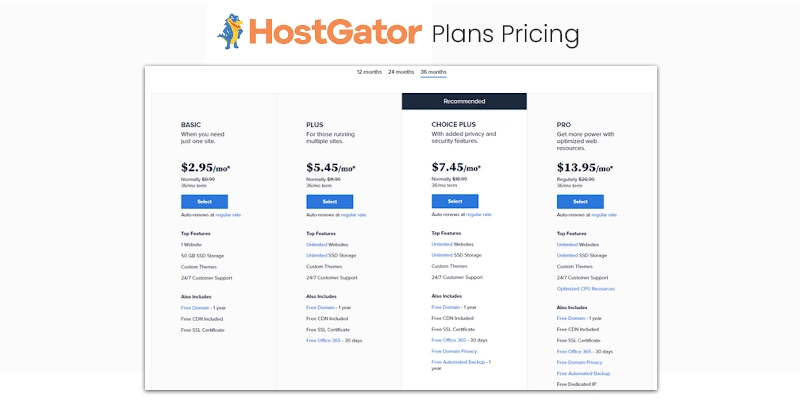
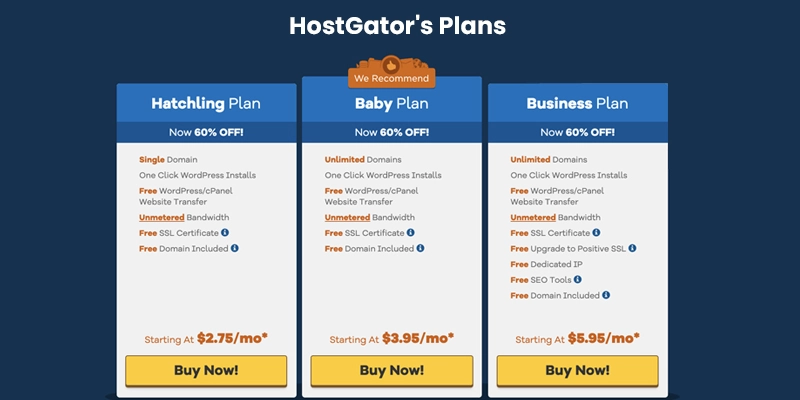
Despite the price differences, both the competitors offer few similar aspects like:
- Unlimited SSL certificates
- Free domain name for a year
- 1 website share on entry-level plans
What does each plan entail?
Bluehost Basic Hosting plan of $3.95 per month:-
- This plan has unlimited bandwidth
- Only permitted to one website
- Gives SSD storage is 50GB
- Has Free domain and SSL certificates
- Best suited for small business or personal websites
HostGator Hatchling Plan of $2.75 per month
- Gives unlimited SSD and Bandwidth
- Allows up to 1 website only
- Also offers a free domain and SSL certificates
- A great option for personal, portfolio, or blogging web
Bluehost vs HostGator Pricing Based on Different Hosting Methods
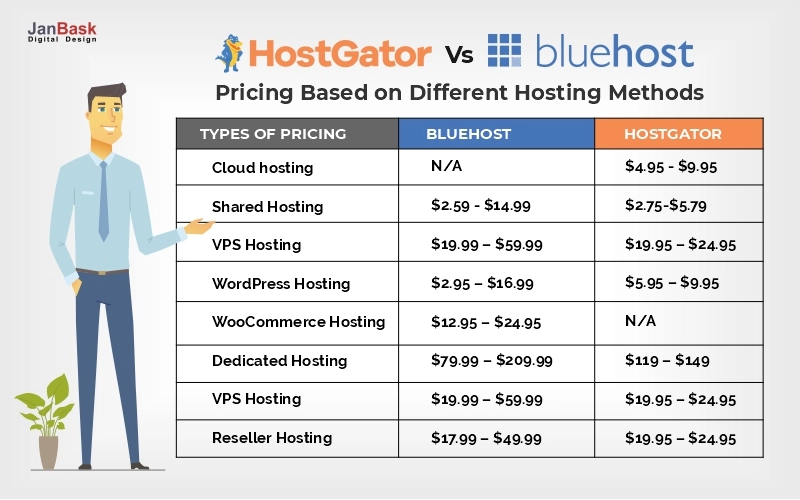
3. Bluehost vs. HostGator - Which one has Better Speed, Uptime & Overall Performance?
In this digital era, your website can’t afford to have downtime for a single second. The speed of your website is dependent on your host's server configuration, if it’s messed up, your website’s load time will be messed up too. This is why it is very important to have a quality hosting provider by your side.
A few years back, neither Bluehost or HostGator had impeccable uptime and load times, but after having an infrastructure overhaul, both of them had a major upgrade, which showed in their performance and data.
Bluehost vs. HostGator - Uptime
- Bluehost leverages industry-standard servers and delivers an uptime of 99.98%. But the thing is, they don’t sign up to any SLA (Service level agreement) with you, just like HostGator.
- HostGator just like Bluehost also uses the industry’s standard servers, and unlike Bluehost, it offers 99.9% of uptime, and has a service level agreement in place.
Bluehost vs. HostGator - Speed
There are many statistics to support the fact that a fast-loading website attracts more sales than a website that takes its sweet time. 32% of visitors are bound to leave a website if it takes more than 1-2 seconds to load. Bluehost’s loading speed has dropped by the previous year, which is 688 ms. A few years back, HostGator’s loading speed was over 1 second, but they improved their speed quite a lot and have made it possible to touch 734 ms.


4. Bluehost vs. HostGator - Which one Has Better Customer Support?
Customer support is a very underrated but yet very important factor that should be considered while differentiating between the Bluehost vs. HostGator.


After all, you do need some extended support to report any issue, if any arises. Those issues can be as petty as upgrading your hosting plan or as big as asking consultancy in case there is a sudden spike of traffic.
If we talk about HostGator’s customer support, it has improved a lot over time, the response time is quick now. You can easily consult their executives through 24/7 chat support, a smooth ticketing system, and a toll-free number to dial at any hour.
Whereas if we talk about Bluehost customer support, it’s quite less effective than that of HostGator. Though it also offers live chat, toll-free calls, and ticket raising system, their team lacks qualified technicians to handle issues. Many people witnessed issues even after they were diagnosed and fixed in the first place. However, Bluehost’s live chat support is very fast and 24/7 available.
Both of them offer customer support, but if we have to compare, we can say HostGator’s support staff acknowledges problems really fast and has effective remedial solutions as they have highly skilled technicians onboard.
5. Bluehost vs. HostGator - Which one is Best for WordPress?
WordPress is leveraged by more than 35% of websites globally. To start any website or run a blog with WordPress, you need to ensure the hosting plan you are searching for is compatible, easy to integrate and secure your WordPress site.
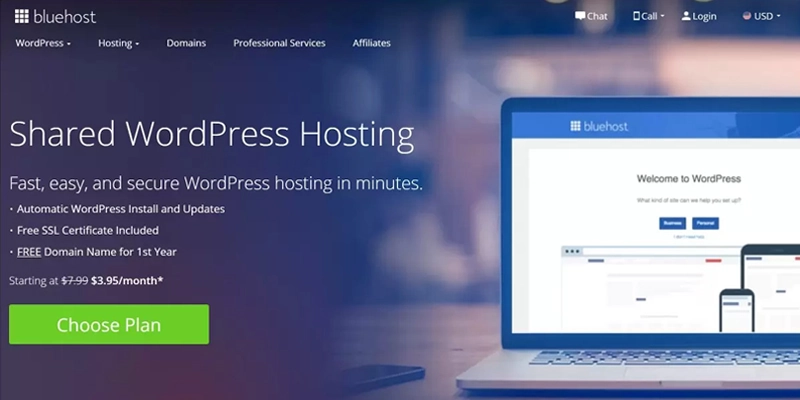
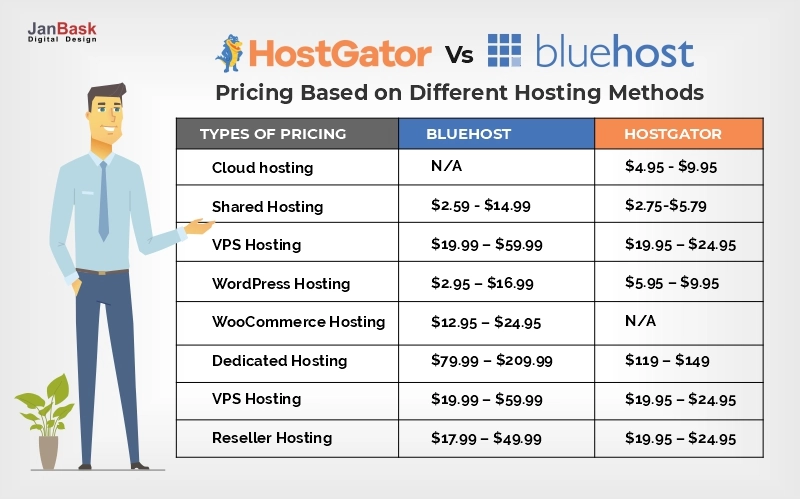
6. Bluehost vs. HostGator - Which One Doesn’t Compromise on Security?
Both the hosting platforms offer free SSL/TLS certificates along with daily backups to prevent websites from compromising their safety.
- Bluehost Security
Across all plans, Bluehost gives you free SSL/TLS certificates and daily backups. Bluehost’s WP pro plan even tells you where the data centers are, where the data is collected and used.
Bluehost relies on third-party security provider Cloudflare, which helps in protecting the website from DDos attacks.
Other features Bluehost gives are password-protected directories, spam protection, and the authority to blacklist any suspicious IPs. Bluehost runs at least 3 automated backups on either a daily, weekly, or monthly basis, as prescribed.
- HostGator Security
Via custom firewall rules & large mod security rule sets, HostGator helps in protecting the web from DDoS attacks.
It is capable of enabling floor protection on a network level via the data centers, whenever there is an attack.
Other than these, they have other security protocols & methods, which are kept confidential and are leveraged in the time of need. HostGator conducts random backups once a week, on any day.
And there is only 1 backup completed and kept at a time, which is quite not useful if you keep doing regular changes to your site. Also, they enforce backups using 3rd party applications, which might not be safe and sound.
7. Blue host vs HostGator - Which One Has More Upbeat Features?
Other than splendid performance, security, flexibility, both of these contenders also offer some additional features that are worth monitoring and putting bets on.
Bluehost Features
- Has one-click WordPress installation
- Has cPanel to easily manage your website.
- Migrates 1 WordPress-based website for absolutely free.
- Bluehost works in collaboration with Cloudflare to prevent hacks, hotlinks, and provide content fast to returning visitors.
- You get 2-factor password authentication and password-protected directories.
- In different plans, you will have different features such as free SSL certificates, spam protection, site backup, and other domain protection features.
- At the new account, you even get $100 for Google ads & Microsoft adverts.
HostGator Features
- Here is also cPanel to manage the one-click WordPress website and server.
- Here it also offers website builders to build mobile responsive websites or eCommerce stores.
- It allows you to transfer all the websites under the same cPanel account for free.
- HostGator also has daily backup features, SSL certification, malware protection, dedicated IP, SEO tools & more.
- You get 100$ on a new account for Google & Bing adverts.
8. Bluehost vs. HostGator - Which One Has Better VPS?
Web hosts divide their large servers into multiple virtual machines, which are often called virtual private servers. VPS hosting is another type of hosting when you require more resources than shared hosting.
VPS hosting is preferred when you have more than one website, which receives traffic of more than 10,000 per day.
VPS is self-managed hosting, unlike shared hosting, where you will be responsible for maintaining and optimizing servers, on your own.
Bluehost and HostGator, both use the WHM control panel interface to support VPS hosting, which allows you to:
- Create a different cPanel account for every website.
- Allocate resources to every website according to its requirements.
- Conduct basic system and control panel maintenance.
- Manage all the websites from only one control panel.
The response time of both the VPS providers is amazing when the traffic in bulk is sent to both of them.
Hosting Providers That Are Also a Great Option Other Than Bluehost or HostGator!
If you want to other hosting providers, here are the few options that are fast, secure, and reliable:
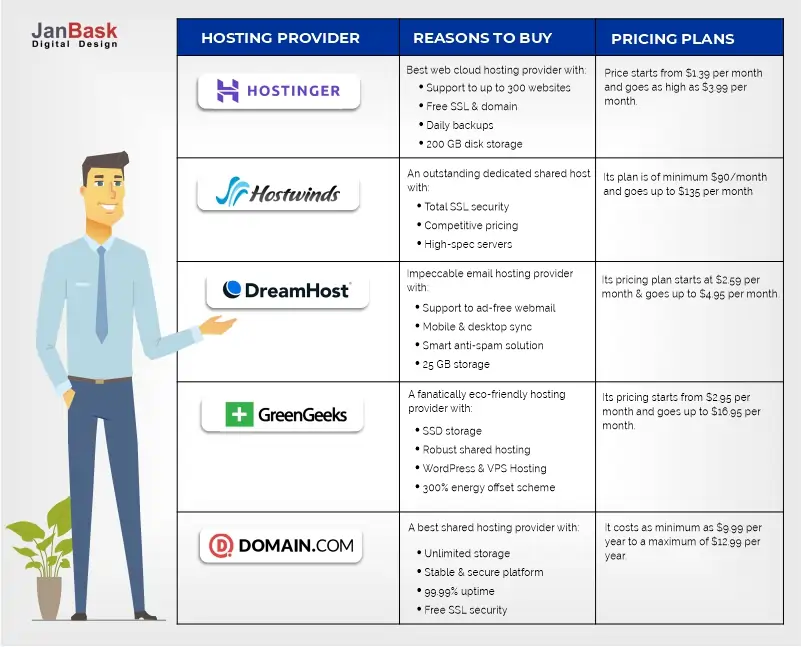
Final Thoughts on Bluehost vs HostGator!
Hope this guide on HostGator vs Bluehost has helped to navigate your answer about which one is an ideal fit for any personal or enterprise web needs.
In the end, you just need to pick one hosting provider that seems right for your pocket and your unprecedented performance needs. Even if you end up choosing either of these out of whim, it’s very easy to switch the hosting partner at any hour.
So to recap, between Bluehost or HostGator which one is better? Well, to be honest, both are quite similar and have not so many overarching differences to state the clear winner. But we would say, between Bluehost versus HostGator, simply choose the one that seems simplistic to use and has suitable hosting pricing plans to get started with.
However, if you are just starting a website, if you consult a professional website design agency, they will take care of the complete cost from website design to a domain name to choosing a hosting provider.
Check out our amazing ideas for your websites over a quick and free project analysis & estimates!
Tell us which one is your favorite between Bluehost vs HostGator? Did we miss any other features about HostGator or Bluehost? Share with us in the comments down below which one between Bluehost versus HostGator you would pick.
FAQs on HostGator vs Bluehost
Here are some frequently asked questions about HostGator or Bluehost!
- Which one is better between Bluehost vs HostGator?
Between Bluehost vs HostGator, there is still not a fixed answer, as both of them are equally strong, speedy, and performing. These both are heavyweights serving millions of websites globally, whichever you choose between the two, you won’t risk your money and website security for sure.
- Does Bluehost or HostGator offer any money-back guarantee?
Bluehost has a money-back guarantee within 30 days, for all of its hosting plans. HostGator has a 45 days money-back guarantee, which applies to all plans except where dedicated servers are involved.
- Are Bluehost and HostGator owned by the same company?
Yes, Bluehost and HostGator are owned by the same company which is Endurance International Group (EIG). However, being from the same company they are both managed by different teams and which is why they have quite visible differences between them.
- Do these hosting providers HostGator or Bluehost provide data migration services?
Yes, both of them provide free website migration to other providers. In the case of a HostGator, you have to apply for it within 30 days of signup. And Bluehost migration is available for all WordPress websites.
- HostGator web hosting vs WordPress hosting - which one is better?
In the comparison of HostGator web hosting vs WordPress hosting, you can choose any based on your requirements. Supposedly if you are looking for generalized hosting services, you can go for web hosting, however, if you are looking for hosting services optimized and tailored specifically for WordPress, you can go for WordPress hosting.
So between HostGator WordPress hosting vs web hosting, choose the one that fits your budget and usability needs.
- Bluehost vs HostGator WordPress hosting - which one is better?
Between HostGator vs Bluehost WordPress, Bluehost has been acknowledged as the best, as it is also recommended by WordPress personally. The HostGator hosting supports the concerns of WordPress CMS very well.
- HostGator vs WordPress - Which one is better?
Both the HostGator vs WordPress are quite good at their own place. Both of them offer great solutions which are usable, creative, affordable, and helpful to bring businesses and people online. WordPress does a great job as a content management system, however, HostGator is also a website builder but looks more suitable for putting up hosting capabilities for websites.
People Also Read:
- 10 Steps to Make Business Website in Minutes With WordPress
- How to Start an eCommerce Store?
- How much does it cost to start a business?
- How web hosting & web design help drive traffic?
- Reasons Why Cloud Hosting is Right for Your Business
- Should You Build a Website with GoDaddy?



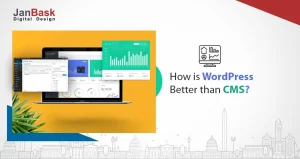
B
Earlier when I compared both services and features, I was confused to choose the best among them but thanks to this blog, I can choose easily.
J
My priority is maximum uptime and I think HostGator uptime is 99.99%, so I will go with that.
C
Personally, I felt, Bluehost was the overall winner.
C
Since both are best and almost similar, it means we can purchase hosting from any of them.
E
Last year I purchased hosting services from Dreamhost but was not satisfied with their services. Can I migrate the website to Bluehost?
C
I was aware about Bluehost but Hostgator was new to me. Thanks for the information and spreading information related to both Bluehost vs Hostgator.
N
I have been using Bluehost for more than a year now and I think it is the best platform to use for hosting.